Number Of Minors Killed In Iran Protests On The Rise
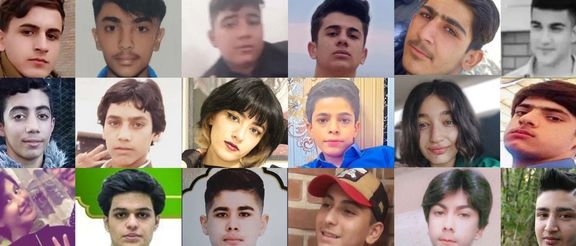
The number of young and underage protesters killed in Iran’s nationwide uprising by government security forces continues to increase.

The number of young and underage protesters killed in Iran’s nationwide uprising by government security forces continues to increase.
Based on reports received by Iran International, Mohammad Hossein Kamandlou, 17, was killed on November 22 in Moshiriyeh neighborhood of Tehran and his funeral took place under strict security measures.
Activists say Arshiya Imamqolizadeh Alamdari, 16, who was detained for 10 days and charged for grabbing and tossing the turban of a cleric in Jolfa in East Azarbaijan, committed suicide just two days after being released.
Reports have also indicated that Maedeh (Mahak) Hashemi, 16, was killed by batons strikes in Shiraz Thursday, and her body was buried in the presence of security forces.
An human rights organization Hengaw based abroad reported that Reza Kazemi, 16, from Kamyaran in Kordestan province succumbed to injuries he received when security forces shot him during protests.
Masoud Dolatshahi, 38, who was shot in the chest in the Saadat Abad neighborhood of Tehran on November 20, also died on Monday.
Meanwhile, Mohammad Jaafar Ghaempanah, a cornea specialist, said in a video that hundreds of protesters have lost their eyes due to being hit by pellets from shotguns used by police and plainclothesmen.
On Friday, 140 ophthalmologists in a letter to the head of the Iranian Ophthalmology Association warned that many citizens have lost their vision by pellets and paintballs.
Previously, Jalal Mahmoodzadeh, an MP, said at least 105 people have been killed in Kurdish regions in the past month based on unofficial reports.

Iran and the US are set for their clash on the soccer pitch with both at the risk of elimination from the 2022 Qatar World Cup, one of the most contentious in history.
The final of Group B – the most politically charged group at this year's tournament – is set to be held on Tuesday night. Iran won its previous match against 10-man Wales 2-0 after its humiliating 6-2 loss against England. The Americans, however, displayed a stable performance in their two earlier matches that ended with a goalless draw against England and a 1-1 tie with Wales.
The Iranian squad – nicknamed Team Melli – needs at least a draw to book a berth for the knockout stage but the Yanks must defeat Iran if they want to keep their hopes alive in the competitions. However, Team Melli players are between a rock and a hard place as many Iranians believe the so-called national team does not represent the nation and is only a propaganda tool for the ruling Islamic regime.
One of the controversial issues is whether or not Team Melli would sing along with the Islamic Republic anthem. The players remained silent during their opener against England but after the match, people’s reactions on social media and streets indicated that the gesture was not enough to forgive the players, who have lost popularity due to their lack of support for the current wave of popular protests. In their second match, the players sang along with the anthem and even celebrated boisterously after scoring goals and winning the match, setting the ground for the world to witness the rift in Iranian society.
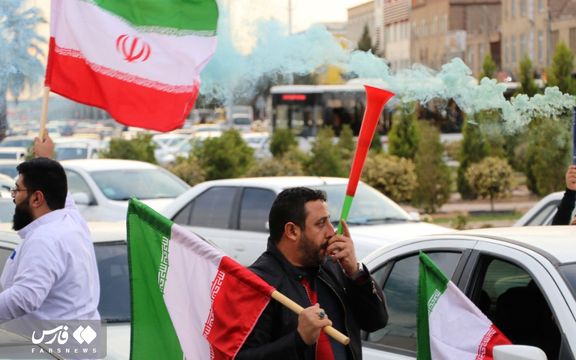
Most Iranians were filled with mixed emotions following the match against Wales. Until recently, whenever Team Melli managed to defeat another country, people would pour into streets and celebrate as security forces were watching and waiting for them to start chanting antigovernment slogans, so they would intervene and disperse the crowd. This time was different. Security forces – some of whom were killing the antigovernment protesters since September – seemed to have been ordered to celebrate and dance on streets, creating some of the most surreal scenes in large cities. The regime had managed to make the players so distant from the people that an event – which historically tends to morph into an antigovernment rally – turned into a show of public satisfaction for the regime.
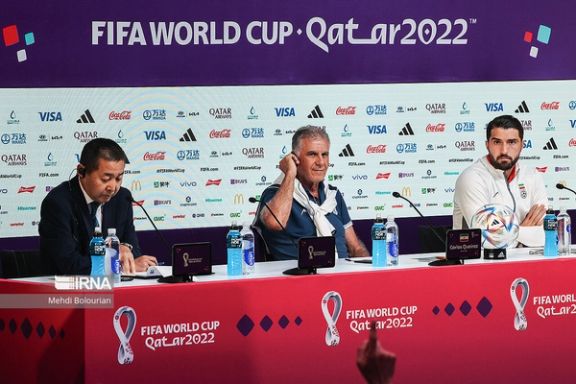
It did not take long until documents and audio footage were leaked online that proved people’s conjectures were actually right. The hacktivist group Black Reward got access to Fars news agency, affiliated with the country’s Revolutionary Guards, and released documents that showed the Islamic Republic had taken numerous measures to make the best use of the World Cup opportunity in Qatar. They had done everything they could think of for a good show in support of the Islamic Republic: from giving free tickets to over 6,000 of their apparatchiks to attend the matches; collaborating with Qatari officials to get the list of people who had bought tickets, and ensuring that Team Melli’s coach Carlos Queiroz would cooperate with them in their plans. They even pulled some strings to make sure that Iran International reporters were not allowed in Qatar.
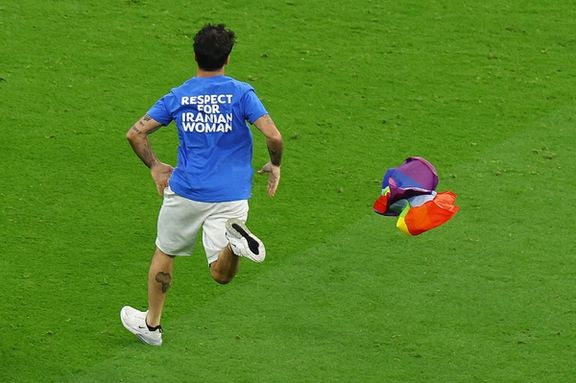
Citing a source involved in the security of the games, CNN reported Monday that even the families of Team Melli players have been threatened with imprisonment and torture if the players fail to “behave” ahead of the match against the USA. The source added that the players were called to a meeting with members of the Revolutionary Guard (IRGC), saying that they were told their families would face “violence and torture” if they did not sing the anthem or if they show any act of protest against the Tehran regime.
Sunday night, Iran’s President Ebrahim Raisi also held a phone conversation with Qatari Emir Tamim bin Hamad Al Thani and football was not mentioned in official reports about the call, but for many Iranians something must have been discussed.
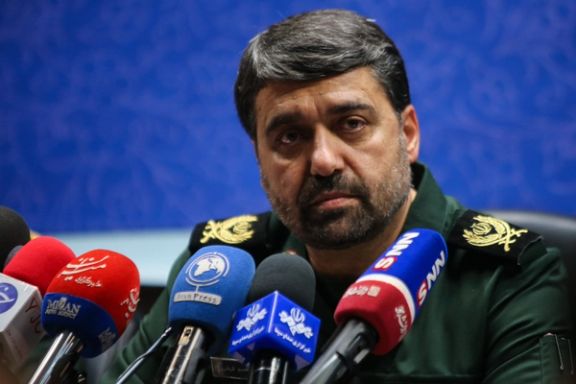
An audio file obtained by the hacktivist group, Black Reward, has revealed concerns among Iranian officials about worn-out security forces, media failure and strikes.
Black Reward found access to Fars News Agency’s digital files in recent days providing Iran International with an audio tape of a meeting between a Revolutionary Guard general and a group of media managers or representatives from outfits affiliated with the IRGC.
We published one part of the audio file Sunday which detailed coordination between Iran and Qatar to silence dissidents during the World cup. The new part of the file is about plans to quell popular protests in the country.
In the file, which is almost two and a half hours long, Qasem Qoreyshi, the deputy commander of the paramilitary Basij and media representatives have expressed concern about the fatigue of the regime’s security forces, the strikes in 22 provinces and the defeat of the Islamic Republic in the “media war”.
Qoreyshi also speaks against Molavi Abdolhamid, the Sunni Friday Prayer Imam of Zahedan in Sistan-Baluchestan province in the southeast, making suggestions to damage his reputation.
In early November Abdolhamid strongly criticized the authorities for their brutality in the province, holding Supreme Leader Ali Khamenei responsible for government violence against Sunnis and other protesters.
In the meeting, state media managers say 22 provinces were the scene of strikes on November 15, adding that around 70 to 100 percent of markets and bazaars were shut down on that day.
Based on the file, most of the closures were in capital Tehran and in some cities almost 100 percent of the shops and businesses were closed.
It is also mentioned that students in 62 universities and colleges across Iran have held gatherings while 11 others were the scene of sit-ins.
In another part of the leaked file, Qoreyshi says the attack on Sharif University, October 2, was carried out by agents of the Ministry of Intelligence.
In the meeting it is also stated that the reformists had separate meetings with President Ebrahim Raisi, Chief Justice Gholam-Hossein Mohseni-Ejei and National Security Chief Ali Shamkhani.
Media reports in the past week confirm that Iran’s ostracized reformists have been meeting officials and trying to suggest solutions about how to pacify the protests, so far with no apparent success.
According to the media managers, Ali Shamkhani, has predicted that sanctions against the Islamic Republic will increase and more “investments” will be made “in media war.”
For regime officials, ‘media war’ means winning the narrative, which has become much more difficult with people having mobile phones and access to the Internet to share scenes of protests and the subsequent brutality of the security forces.
Someone also quotes Shamkhani as saying that “we completely failed in the media war.” In another part of the file, he is also quoted as expressing that 70% of Iranians believe their living conditions are declining.
It is also revealed in the file that Supreme Leader Ali Khamenei has complained about the silence of the members of the Expediency Council regarding the protests.
According to one of the speakers, Khamenei in his meeting with Police Chief Hossein Ashtari has warned that “You must not lose your confidence.”
The managers of the state-affiliated media have also demanded a pay raise for special police forces warning, “There is no good news about police forces. They are exhausted and so unhappy, especially after the events happened in Sistan and Baluchestan.”
Iranian security forces killed almost 100 Baluch citizens, including children, and injured hundreds of others after firing assault rifles, shotguns and teargas at protesters, bystanders and worshippers during a violent crackdown after Friday prayers on September 30 and also later in October and November.
According to Qoreyshi, Khamenei demanded that Molavi Abdolhamid must be warned about his comments.
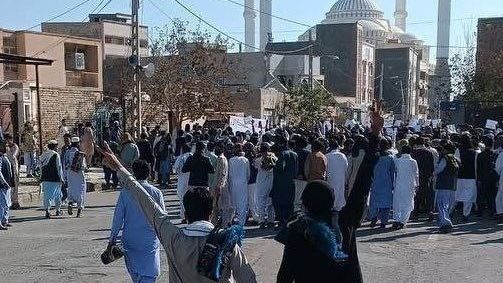
Qoreyshi adds that “We made a mistake about Abdolhamid. We first eliminated tribal leaders in the region to give more credit to Abdolhamid. However, he didn’t carry much weight [in the past].”
The media managers also express concern about the deteriorating health condition of detained rights activist Hossein Ronaghi saying that his possible death before the World Cup can lead to another Mahsa Amini situation because he “has lots of fans in Azarbaijan Province.”
At the beginning of the meeting, one of the participants says 10,000 World Cup 2022 tickets will be distributed among the government-affiliated forces to go to stadiums in Qatar. He says these spectators will be accommodated in Kish Island in southern Iran to be transported to Qatar to watch the matches.
Another person says, “there are five thousand cameras in stadiums, and they record every move of the opponents of the Islamic Republic.”
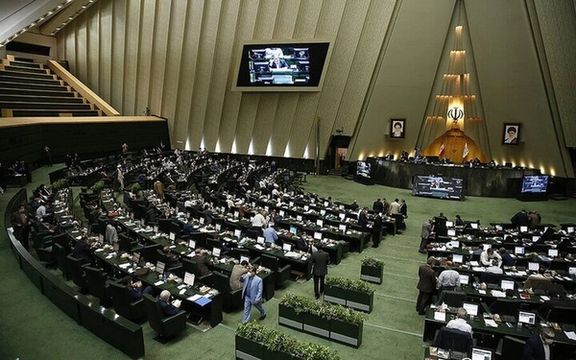
The Islamic Republic’s parliament is honing regulations that would enable the authorities to execute anyone who speaks or sends images to foreign media outlets.
Since the current wave of protests began in Iran following the death in custody of Mahsa Amini, the authorities have been trying to restrict the spread of information both within the country and from inside the country to the international community.
In its latest move, the regime plans to ratify laws that would pave the way for executing people who are helping the world hear the voices of dissent. When finalized, the new law would help the hardliner Judiciary issue death sentences for anyone contacting foreign-based media.
The plan “to intensify the punishment of collaborators with the actions of hostile countries against national security and interests” describes any cooperation with “hostile countries, including the US government” as espionage. It considers any such cooperation as “corruption on earth,” which is punishable by death according to the Islamic Republic's Penal Code. According to Article 286 of the Constitution, any serious disturbance in the public order, causing insecurity or major damage to people or public and private property, or spread of corruption or prostitution on a large scale, is considered a ‘corruption on earth’ offense and will lead to a death sentence.
Mobile phones and the Internet made it possible for citizens to record acts of violence and brutality by security forces, which was not possible two decades ago. This has exposed violations of citizens’ rights and has worried the Islamic Republic.
A committee, comprised of representatives from Intelligence Organization of the Islamic Revolutionary Guard Corps (IRGC), the Intelligence Ministry, Army and Parliament’s National Security Committee, is tasked with determining those who are subjected to the new law.
Filming any criminal acts on streets, including those that lead to injury or death would be punishable by law. “In case of sending the videos or images to hostile or foreign networks, the perpetrator will be sentenced to the maximum penalty,” read the text of the draft bill. After getting the approval of the parliament's criminal law committee, this plan must be approved by the representatives in a public session, and finally, it must be approved by the Guardian Council and notified by the president to become a law.
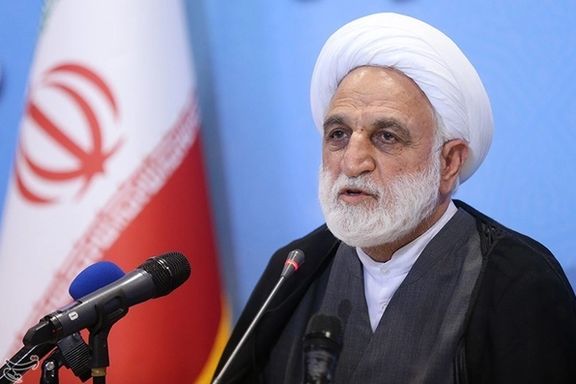
On Monday, the head of Iran's notorious Judiciary, Gholam-Hossein Mohseni Ejei, also called for prompt indictment of anyone who publishes “a false statement or an undocumented claim.” He called on judges to summon those people to the court as soon as possible, and if they do not provide documentation for their claim, “it is clear that they are acting in line with the enemy's goals.”
This means that once someone uses freedom of speech and criticizes the authorities, the Judiciary can indict and convict the person without due process of law, which is a common practice in Iranian courts.
The regime has tried all the tricks in the book, including internet shutdowns, arbitrary arrests, brutal crackdown, and threats both in Iran and abroad but dissent has increased. Whenever the internet is down, people find other ways to make their voices heard; whenever the regime intensifies its attacks on protesters and more people are killed or arrested it leads to more anger; and louder international condemnations.
Something that has especially outraged the Islamic Republic is the coverage of the developments in Iran by foreign-based media, especially Iran International, BBC, VOA, and Radio Farda, which are providing round-the-clock news about the popular uprising and the regime’s atrocities. Faced with nationwide antigovernment protests with no end in sight, the Islamic Republic keeps blaming these broadcasters of “fomenting unrest”, while all media in the country are under tight government control and present protesters as “rioters” and “terrorists”.
Iran’s Intelligence Minister Esmail Khatib on November 9 said the Islamic Republic regards Iran International as “a terrorist organization,” adding that its workers and anyone affiliated with the channel will be pursued by the Ministry of Intelligence.
London’s Metropolitan Police earlier this month informed Iran International of threats by Iranian agents against its journalists.
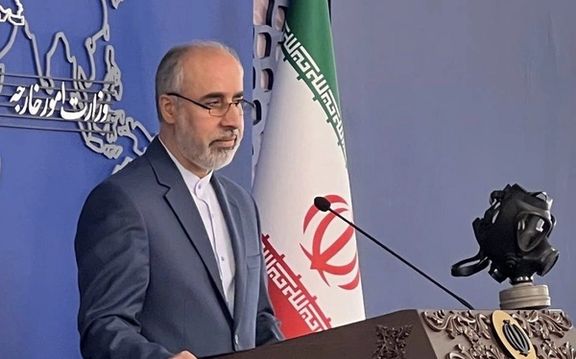
Iran will reject a newly-approved independent UN investigation into the country's repression of antigovernment protests, like it refused to cooperate with UN human rights rapporteurs for 30 years.
In his weekly press conference on Monday, the Islamic Republic foreign ministry spokesman Nasser Kanaani said that "Iran will have no cooperation with the political committee formed by the UN Rights Council," referring to the UN Human Rights Council’s Thursday resolution based on which an international panel will be formed to investigate the violence against protesters.
Kanaani made the remarks as he showed up at his weekly press conference with a chemical mask, which was apparently meant to allude to Germany's support for Iraqi dictator Saddam Hussein during the 1980-1988 Iraq-Iran war and the alleged supply of material for chemical warfare by Berlin to the Ba’ath regime. Tehran also summoned German envoy Hans-Udo Muzel on Monday over Berlin’s key role in holding the UN Human Rights Council special session.
Criticizing the UN for “the hasty employment of human rights mechanisms and their instrumental use against independent states,” he said such an approach will not provide any help for the advancement of human rights. “The Islamic Republic of Iran will not engage in any cooperation, whatsoever, with the politicized committee established in the name of a fact-finding mission.”
Kanaani said that Iran has set up a national committee comprised of experts, lawyers, official and non-official representatives “within the framework of its national responsibilities which is carrying out an in-depth investigations into the current developments across the country.”
Repeating earlier unsubstantiated claims that foreign countries and their agents are instigating the unrest in Iran, Kanaani said, "We have specific information proving that the America, Western countries and some of American allies have had a role in the protests" without disclosing any details.
Many human rights organizations have criticized the Islamic Republic for not allowing UN Special Rapporteurs on the Human Rights Situation in Iran since 1992. Javaid Rehman, the current rapporteur whose mandate was extended earlier in the year, was appointed July 6, 2018, following Asma Jahangir and Ahmed Shaheed who served before him. The HRC had re-established the mandate of a rapporteur on Iran’s human rights situation in 2011 after terminating an earlier one in 2002.
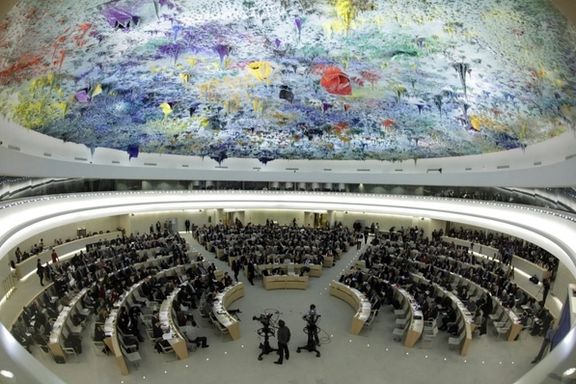
The UN Human Rights Council voted November 17 -- 25 votes in favor, six nays and 16 abstentions -- to launch an independent investigation into Iran's deadly repression of protests, which has killed hundreds of civilians. According to the US-based Human Rights Activists News Agency (HRANA), from September 16 until Friday, November 25, at least 448 protestors have been killed, of which 63 were minors. While the Islamic Republic has not provided accurate figures of those detained in the protests, the watchdog went on to say that at least 18,170 protesters have been arrested including 565 students. HRANA added that 156 cities and more than 140 universities across Iran have also been the scenes of anti-government protests.
On Sunday, the UN Children's Fund also censured the violence against children in Iran, calling for an end to all forms of abuse directed at children.
In another global move over Iran’s denial of women's rights and crackdown on protests, calls on the UN to expel the Islamic Republic from the UN Commission on the Status of Women are also getting stronger with Canada, New Zealand, Netherlands and the United States behind the push. UN Watch, an independent non-governmental human rights group based in Geneva, has drafted a resolution for the 54-nation UN Economic Social Council (ECOSOC) to remove Iran.
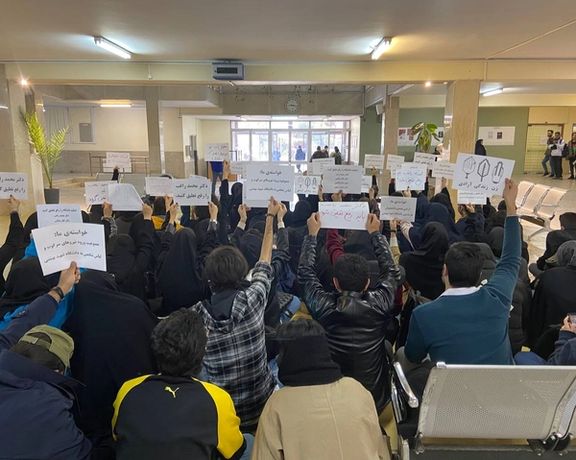
University students have kept up strikes, class boycotts, and sit-ins in some universities in Iran, 74 days after popular protests started against the Islamic Republic government.
The students at Beheshti University held a sit-in Monday in protest to the suspension of professors who supported the students.
In a statement, they announced if the suspensions and dismissals continue, they are ready to boycott classes and end-of-semester exams.
Earlier, an assistant professor of Beheshti university, Mohammad Ragheb, wrote on his Instagram page that he has been suspended because of his participation in anti-government protests.
Previously, Hossein Mesbahian, a faculty member of University of Tehran also stated that he had been fired upon the order of university officials.
On Sunday, students at Tehran University's Faculty of Literature staged a sit-in to protest the dismissal of Hossein Mesbahian.
Iranian media reported that Tehran University political science professor Sadegh Zibakalam was summoned Monday by Tehran Prosecutor's Office.
Zibakalam is an Iranian academic, author and pundit described as reformist and neo-liberal. He appears frequently on international news outlets including the BBC News and Al Jazeera.
The US-based Human Rights Activists News Agency (HRANA) in its latest report said 569 students have been arrested since September 16 when the nationwide protests began in Iran triggered by the killing of Mahsa Amini in police custody.
HRANA also noted that as much as 143 universities across Iran have been the scene of anti-regime demonstrations.